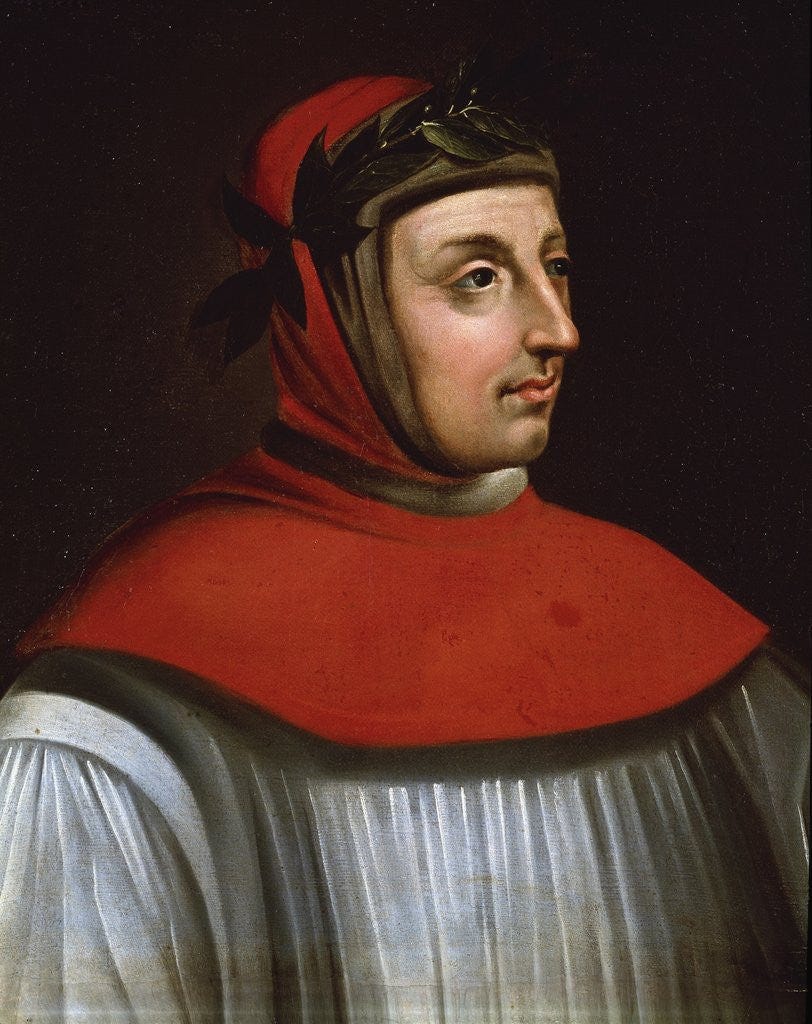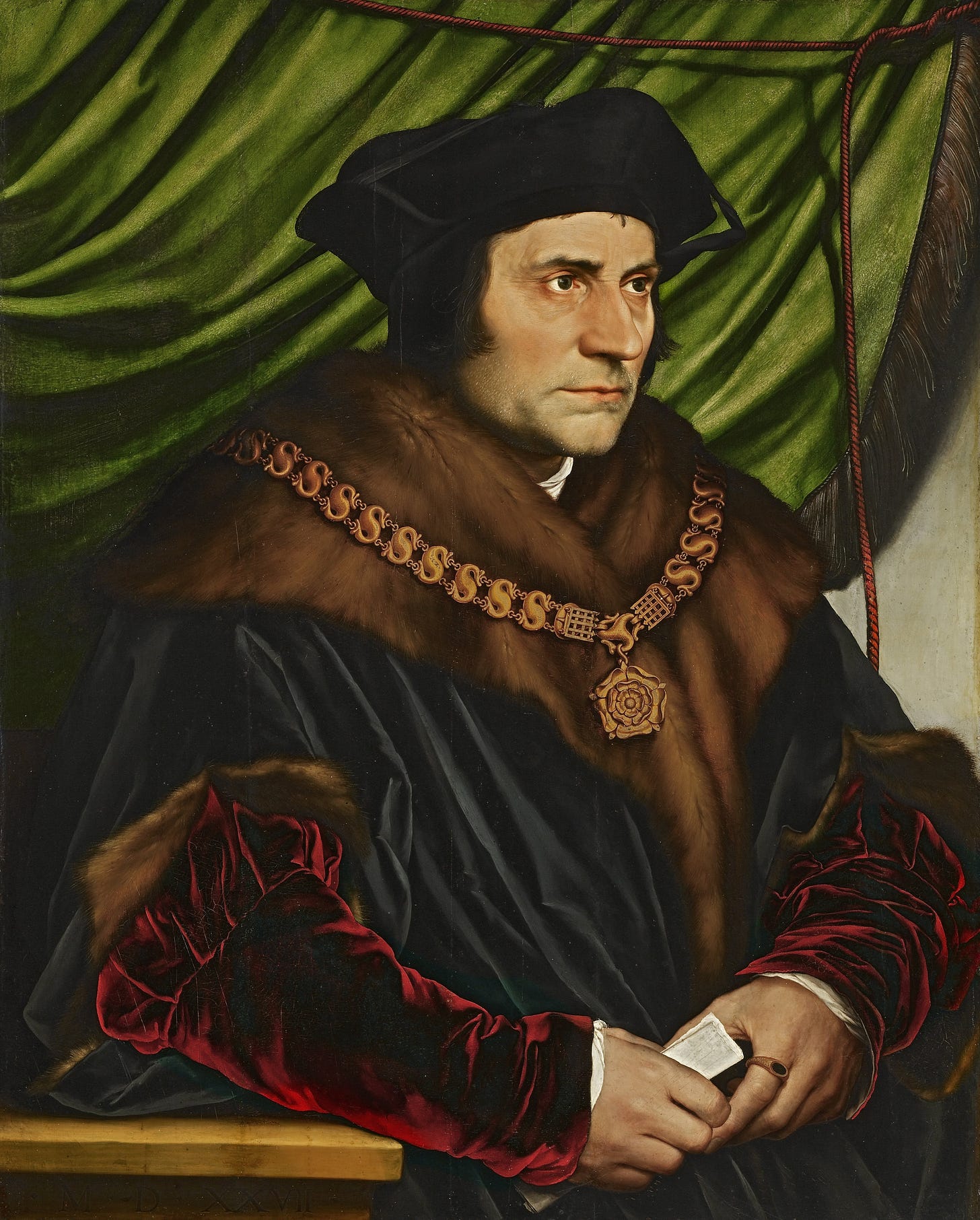The problem of the Prince
Renaissance political thought and its relevance for modern governance

What form of government best serves humanity? Should we prioritize order and security, or justice and fairness? These questions often surface in today’s headlines and social media debates, yet they have challenged Western thought for centuries. Some Renaissance thinkers notably advanced two opposing political philosophies: republicanism and princely humanism (others advocated absolutism, but we ain’t gonna talk about those). An illuminating essay by Eric Nelson (in James Hankins’s Cambridge Companion to Renaissance Philosophy) explores these perspectives, inspiring reflections that just might bring some clarity to our own political discourse in the 21st century.
Consider, to get us started, Francesco Petrarca, whose rediscovery of Cicero’s letters in 1345 is often taken as the “official” starting point of the Renaissance. Petrarca thought that what Italy needed was a prince capable of unifying the fragmented states, which were then permanently at war with each other, against the external threats posed mostly by the French and the Spanish. He pinned his hopes on various candidates he thought would be apt for the task, including Cola di Rienzo (who briefly took over Rome in 1343), Charles IV (the Holy Roman Emperor of Bohemia), and Francesco da Carrara (his last patron and lord of Padua).
Petrarca’s most articulate statement of his political philosophy is a letter he wrote to Carrara in 1373. The letter is considered a quintessential example of a whole genre, which began well before Petrarca and continued after him, often referred to as speculum principis, or “mirror for princes.”
In the letter, Petrarca endorses one of the central themes of ancient Roman political thought, as found for instance in Cicero. He writes that princes should “lust after the treasure of virtue and win the fame of outstanding glory. This is a property that moths and rust cannot corrupt, nor can thieves steal it in the night,” which is pretty much what Cicero writes in De Officiis (On Duties), a book based on a now lost work by the middle Stoic Panaetius.
Exactly as Cicero had argued, Petrarca tells Carrara that “nothing can be useful that is not at the same time just and honorable,” so that the first principle of leadership is that a prince should aim to be loved, not feared:
“Fear is opposed both to longevity in office and security in life; goodwill favors both, and this affirmation is supported by that opinion that one can hear from Cicero.”
Petrarca says that a good prince cultivates the virtues of justice, generosity, humility, temperance, and clemency, but also respects private property and is temperate in the imposition of taxes, lest he risks a revolt from his subjects.
Will a prince be happy while carrying out his duties and governing the people? Possibile, but unlikely, says Petrarca, echoing Plato in the Republic: the political life is one of burden carried out of a sense of duty, and does not allow for much pleasure.
As Nelson succinctly puts it: “Petrarch’s political theory can be summarized as follows: cities ought to be governed by princes who accept their office reluctantly, and who pursue glory through virtuous actions.” Right, but what happens if the prince doesn’t go along with this lofty plan? Petrarch doesn’t mince words here:
“Arms will not defend evil and unjust leaders from the wrath of their oppressed subjects. … [The prince should] act as a careful guardian of the state, not as its lord [and] rulers who act otherwise are to be judged as thieves rather than as defenders and preservers of the state.”
To make even more clear what he means, Petrarca mentions the examples of the Roman emperors Caligula, Commodus, and Heliogabalus, all three murdered as tyrants.
That said, Petrarca doesn’t really elaborate on what the subjects of an unvirtuous prince ought to do short of murder, which led to a vigorous discussion during the later Renaissance and to the formulation of several alternative models of government.
The neo-Roman republican model of checks and balances
One such model is what Nelson labels “neo-Roman,” since it’s essentially the one proposed by Cicero in De Re Publica. The Renaissance version is summarized by Erasmus of Rotterdam: “Monarchy should preferably be checked and diluted with a mixture of aristocracy and democracy to prevent it ever breaking out into tyranny.” This is the republican system that was typical of Ancient Rome and that, during the Renaissance, was implemented by Venice and Florence. It is also, more or less, the modern US model, where the “monarchic” element is represented by a powerful President, the “aristocratic” one by the Senate (which was not elected directly by the people until the 17th Amendment to the Constitution was passed in 1913), and the democratic component by the House of Representatives.
A number of Italian authors contributed to this line of thought, most importantly Leonardo Bruni, in his Laudatio florentinae urbis (Panegyric of the City of Florence, 1403-04). Bruni argued that liberty is the paramount value in a republic, for two reasons: first, it is a good in and of itself, worth staking everything for, as Cicero says in De Officiis; second, it is also an instrumental good, because liberty allows the practice of virtue, which in turn is the guarantor of justice and concordia (internal harmony). As the Roman author Sallust says, kings are more suspicious of good than of evil men, and always fearful of another’s virtue. I wonder about the degree of resonance with what is happening right now in the United States.
The Greek republican-socialist model
A second republican model was elaborated in the 16th century by English scholars who admired Erasmus, the most famous being Thomas More. The project was inspired by the Ancient Greek tradition, and was so controversial that Nelson says “[The] enterprise was met with charges of heresy, and sparked what can only be described as a ‘culture war’ over Greek studies. Indeed, anti-Greek sentiment reached such a fever pitch at Oxford that bands of students calling themselves ‘Trojans’ rampaged through the streets accosting classmates who were studying Greek.”
Erasmus criticized the Roman model because it “permits men to repel force with force; it permits each person to pursue what is his; it approves of commerce; it allows usury; it approves of war as a glorious thing, so long as it is undertaken for the sake of justice.” What, then, was his alternative? He was enthralled by Plato’s Republic, which Erasmus declared to be “the happiest state of a commonwealth,” where everything was held in common. If people could be convinced of the goodness of this, all “war, envy, and fraud” would disappear. In other words: socialism!
The most articulate version of the Greek model, and rejection of the Roman one, is found in More’s “Utopia,” itself a Greek word meaning “no place.” (Perhaps that should have been a hint…) This model also values “freedom,” but of a different kind: the freedom to live according with our natural nature, which is possible only when we are ruled by our moral superiors, Plato’s infamous “guardians,” or philosopher-kings. Utopia also is characterized by justice, but this is not understood—as in the Roman model—as a fair treatment of everyone and a fair distribution of resources, but rather as whatever arrangement Nature decrees.
Plato, as well as his pupil, Aristotle, reckoned that if wealth were allowed to flow freely among individuals pretty soon we would have a class of uber-rich people and one of uber-poor ones. The first would then indulge in all sorts of unvirtuous excesses, while the latter would turn to crime. That’s why Plato abolishes private property entirely in the Republic, and severely limits it in his follow up work, the Laws. (Aristotle does the same in his Politics.) Private property leads to a situation where, says More, “a dunderhead who has no more brains than a post … should command a great many wise and good men, simply because he happens to have a big pile of gold coins.” I’m not a socialist utopian, but here I have to admit that More has a point, as clearly shown, again, by the currently unfolding situation in the US.
Keep reading with a 7-day free trial
Subscribe to Figs in Winter: a Community of Reason to keep reading this post and get 7 days of free access to the full post archives.

